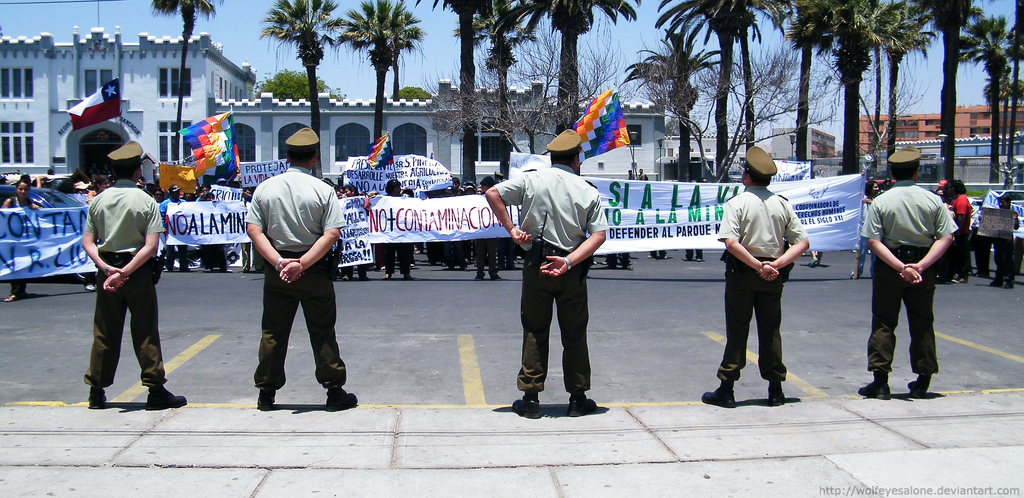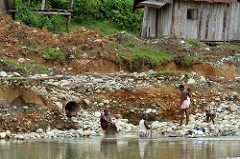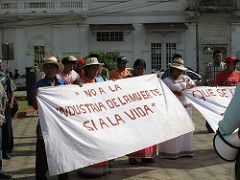What Would Trudeau Do?: The Effect of Canadian Mining Companies in Latin America

During his post as Prime Minister, Stephen Harper enthusiastically promoted the expansion of extractive Canadian industries abroad. Thanks to Harper’s policies, today Canadian mining companies are responsible for up to 70 per cent of mining activities in Latin America. As the new Trudeaumania is at an all time peak, the new Prime Minister has been vocal about a number of issues including his advocacy for environmental and indigenous rights. He is a vocal feminist and ally for LGBTQ+ rights, has cut taxes to middle income families, and has welcomed thousands of refugees to Canada. His vocal advocacy for social justice issues has garnered him a dedicated internet following and media hype.

Despite this, however, Trudeau has remained silent on one issue that contradicts his public policies: Canadian mining companies’ involvement in deterring environmental and indigenous rights in Latin America. This past July, the UN Special Rapporteur on the Rights of Indigenous Peoples, Victoria Tauli-Corpuz, urged the Trudeau administration to regulate its companies overseas. Various Canadian mining companies take advantage of the low oversight and corruption that characterize a number of Latin American governments to practice unregulated and unethical business. Low oversight from the Canadian government on their mining companies abroad also facilitates the immoral practices of these companies. Various reports by the Council of Hemispheric Affairs (COHA) and the Due Process Law Foundation (DPLF) submitted to the Inter-American Commission on Human rights, for example, have documented the continued impact of Canadian mining companies throughout the region that range from environmental damage to human rights abuses. The latter category includes, but is not limited to, forced displacement, deaths, injuries, and systematic criminalization of nonviolent activists. These reports paint a picture of the rampant human rights abuses of Canadian mining companies and their direct involvement in the exacerbation of violence in the region.
Currently, there are approximately 198 active conflicts in Latin America directly linked to mining operations. This are usually led by farming, rural, and indigenous communities. Their social protests against mining operations have led to violent reactions from local governments. In the San Jose del Progreso mine in Mexico, 23 people were detained after publicly speaking against the water contamination. In the Molejon project in Panama, protestors were confronted by teargas cannisters and beaten by the local police force resulting in the jailing of 19 farmers. There have even been reported murders of activists and local politicians who oppose the projects. These conflicts reflect the impunity of mining companies in front of the law. Local governments give priority to a private sector that is giving them funds instead of prioritizing their dissatisfied population. Corruption, bribery and neo-patrimonalism facilitate the establishment of these projects on the region.
Despite their environmental damage and questionable ethics, in front of the local law, Canadian mining companies are untouchable. As a result of Canada’s free trade agreements (FTAs) with many Latin American countries, these companies can establish themselves in the region without much of a regulatory check from either the Canadian or the local government. Even if those trade agreements contain clauses on human rights and environmental protection, there is no tangible legal obligation for either of the signing parties to follow such clauses. Furthermore, as consequence of these trade agreements, mining companies are usually classified as foreign investors, which gives them certain privileges and flexibility in their business methods abroad. According to the Canadian mining report by the Due Process Law Foundation, “they (mining companies) enjoy investment guarantees and in cases of disputes can bring claims against host states in international arbitration forums.”

Trudeau promised “real change” regarding environmental issues during his campaign for Canadian Prime Minister. Publicly, he has backed the Paris agreement, supported the environmental movement and even reached a tentative imposition of a carbon tax for all provinces. Nevertheless, while Trudeau can say the right words, his actions contradict his rhetoric significantly. He recently approved two contentious pipelines and approved the CAD 11.4 billion Pacific NorthWest liquefied natural gas (LNG) project, which is threatening the run of sockeye salmon. It comes then as no surprise that serious environmental impact is another issue overlooked by the Canadian government in regards to the presence of Canadian mining companies in Latin America.
In Panama’s Molejon Gold Mine, for example, the Canadian company Petaquilla Minerals cut down 54.2 hectares of vegetation and forest that were protected by Panama’s National Environmental Authority to make space for the mine’s operations. The Panamanian government’s approval of mining on protected land could be due to the USD 1.9 million licitation made by the Canadian company to the government for permission to work on the land. The Pascua Lama mine is another example where environmental negligence and possible corruption overlap. The Barrick Gold-owned mine is located within the UNESCO-protected San Guillermo Biosphere Reserve, which affects the glacier water reserves in the area. There is evidence that since the mine was established, three glaciers have shrunk due to contamination and pollution. Local irrigators were paid USD 60 million in order to appease community objections. The ones that refused the money and protested the establishment of the mine were subsequently marginalized by the community.
Air, water, and land pollution caused by the establishment of Canadian mines has disrupted the daily lives of the rural inhabitants of such regions throughout Latin America, many of them indigenous communities. Some communities are completely displaced by environmental damage, and the ones that do stay are forced to change their traditional production methods to less sustainable means of survival. Moreover, the overall health of these communities is deeply affected since the toxic water waste of the mines can cause skin disorders, infections and even death. Air pollution due to extraction can cause respiratory illnesses and can elevate bodily levels of mercury, copper and lead, and land contamination affects their sustainable food consumption and their livestock.

Indigenous communities are particularly vulnerable to the presence of mining companies in their territories. The United Nations Permanent Forum on Indigenous Issues has established that around 50 per cent of extractive industries are near or on indigenous lands. A lot of this property is acquired fraudulently, thus taking advantage of the rural and indigenous people that have ancestral claim to their land. A prominent example is the purchasing of land in the GoldCorp-owned Marlin Mine in Guatemala. The largely indigenous community of San Miguel Ixtahuacán and Sipakapa were forced to turn over their lands in exchange for approximately USD 500. Canadian mining companies have also established themselves within indigenous territories without the consent and sometimes even the explicit rejection of indigenous communities across the region. In the town of Tambogrande, Peru a referendum was put in place to vote on the establishment of a mining project by the Manhattan Mineral Company. An overwhelmingly majority of 89 per cent voted ‘no’ to the establishment of the project. Despite this, both the local government and the Canadian company refused to recognize their voices and went ahead with the construction of the mine. When states refuse to recognize indigenous claims to their territory, indigenous communities become especially vulnerable to forced displacement. As detailed previously, the environmental damage caused by mining companies affects indigenous peoples’ relationship to and reliance on the environment. Indigenous communities, then, are forced to move from their territories in order to survive.
In April of 2016, over 180 organizations from Latin America and elsewhere sent a letter to Prime Minister Trudeau requesting that he regulate the activities and punish the unlawful behaviour of Canadian mining companies abroad. To this date, there still has not been an official response to this request. A question then arises: Is the Canadian government responsible for the behaviour of its companies abroad? As opposed to Trudeau’s commitment to environmental care, as well as indigenous and human rights, his continued silence and inaction regarding this issue are a disappointment to the policies and values he has been preaching throughout his political career. Furthermore, multiple watchdog organizations have found that the government vigorously supports mining companies abroad without any regards to the damage they are causing to the environment and Latin American communities. This does not come as a surprise, since according to Natural Resources Canada, the value of Canadian mining assets abroad is CAD 170.8 billion, roughly equivalent to 3.5 per cent of Canada’s gross domestic product. It is important to note, however, that back in 2011, Bill C-300 was introduced in order to address the situation. The bill sought to “promote environmental best practices and to ensure the protection and promotion of international human rights standards in respect of the mining, oil or gas activities of Canadian corporations in developing countries.” The bill was defeated by a small margin, but the issue has not been brought up again in Parliament since.
Mr. Trudeau, who champions himself as the antithesis of Mr. Harper, has certainly kept the same attitude as his predecessor regarding Canadian mining abroad, choosing to ignore the issue. With their neo-colonialist attitude, these mining companies are not only destroying communities but the environment as well. Local and indigenous Latin American communities will continue to be negatively affected by extractive Canadian industries if the Canadian government decides to remain wilfully ignorant. The Trudeau administration especially should be held accountable for the duality of their domestic and Latin American policies. The “sunny way” that Mr. Trudeau seemed to reference during his campaign for Prime Minister certainly does not seem so bright for Latin American communities. There has long been a shadow cast by Canadian mining companies and the complicity of the Canadian government over the development of rural Latin America. In order for the sun to rise again, the Trudeau administration should consolidate their campaign promises and ongoing rhetoric, not only domestically but abroad as well.
